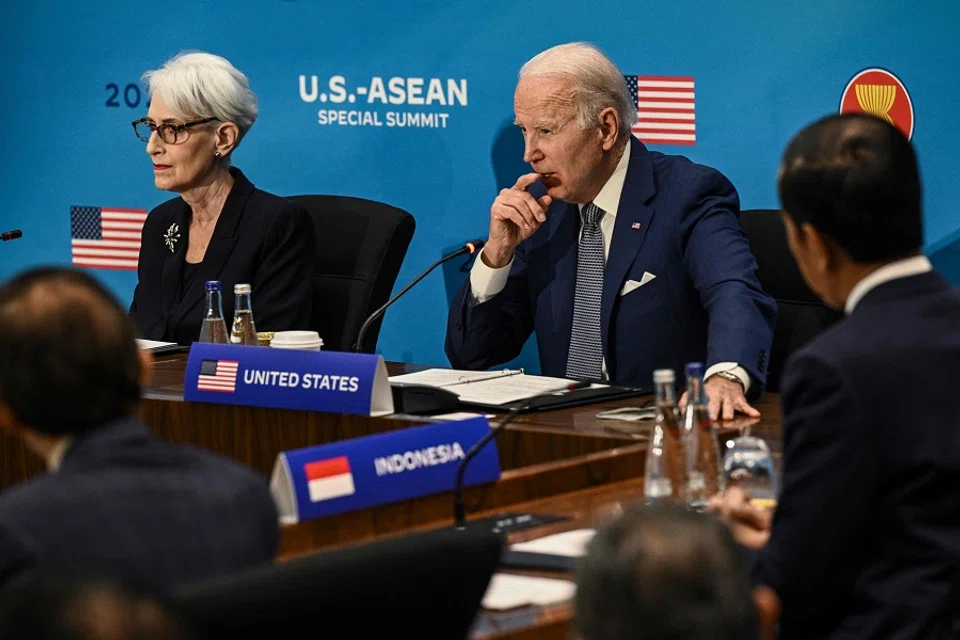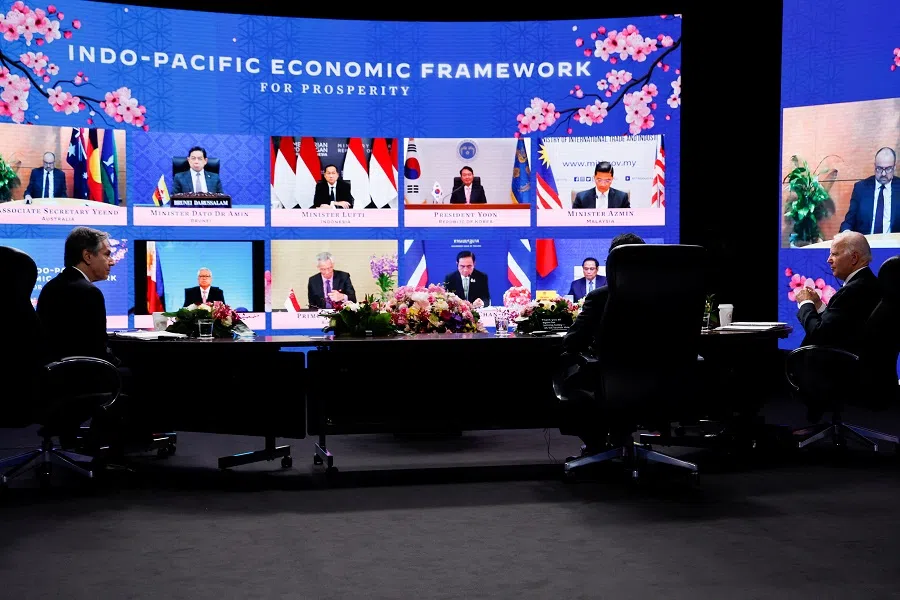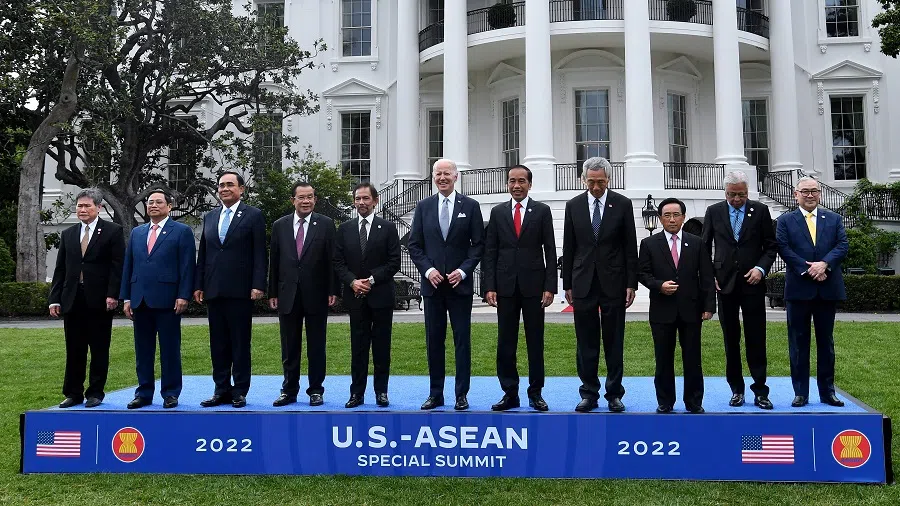Finland and Sweden today, Southeast Asia tomorrow?
With Finland and Sweden applying to join NATO, some in Asia are asking if Southeast Asian countries will follow suit and seek an alliance with "like-minded" powers. Malaysian academics Kuik Cheng-Chwee, Abdul Razak Ahmad and Lai Yew Meng explain why such realignment is unlikely in Asia (for now).

In light of Finland and Sweden's bids to join the North Atlantic Treaty Organization (NATO) in the wake of Russia's invasion of Ukraine, some observers have opined that small and secondary states in Southeast Asia will, sooner or later, join an alliance with "like-minded" powers. The underlying assumption is that autocratic China will act like autocratic Russia, and weaker states in Asia must act now to ensure their own security and preserve regional stability before it is too late.
This assumption has deepened after US President Joe Biden's trips to Japan and South Korea in late May to boost the administration's Indo-Pacific strategy. Biden stressed, apparently with China in mind, that stronger ties among like-minded nations are required, amid "competition between democracies and autocracies".
In a recent speech in Washington, DC, US Secretary of State Antony Blinken described China as "the most serious long-term challenge" to the rules-based order. To meet this challenge, Blinken emphasised the need to "invest" in the US's own strength, "align" with allies and partners, and "compete" with China's "illiberal" order to defend US interests and build the US vision for the future.
Southeast Asian countries do not perceive China as a clear-cut threat, and steadfast allied support is less than certain.
A different situation in Asia
These views may seem sound but, in the foreseeable future, such a realignment is unlikely in Southeast Asia and much of Asia. The smaller European states are realigning because the threat from Russia is more profound and direct. Support from the US-led NATO is also immediately available, credible, and reliable. These two conditions - a straightforward threat and a highly dependable allied support - are not fully present in Asia. That is, Southeast Asian countries do not perceive China as a clear-cut threat, and steadfast allied support is less than certain.
The ASEAN states' relations with China have remained mixed. While China has been a source of growing security and territorial concerns, especially to the claimants in the South China Sea dispute, China is also an indispensable economic and diplomatic partner to the Southeast Asian governments in tackling more pressing domestic challenges and non-traditional security problems as they engage in post-Covid-19 recovery. These ambivalent perceptions contrast sharply with the European states' unambiguous perceptions of the Russian threat.
Southeast Asian states are also uncomfortable with the values-based, ideologically-driven "democracy versus autocracy" divide.

Equally important, unlike the European states, the Southeast Asian states do not view the projected allied support as conveniently available and highly dependable. The ASEAN states do not view an alliance as a principal, one-size-fits-all instrument to deal with their numerous external challenges. In a region with numerous semi-democratic and authoritarian regimes, Southeast Asian states are also uncomfortable with the values-based, ideologically-driven "democracy versus autocracy" divide.
Having experienced centuries-long Western colonisation and decades-long Cold War politics, Southeast Asian countries view the present-day US-Russia and US-China rivalries more as big-power competition than ideological contestation. They deem the ongoing war in Ukraine as a proxy war between the major powers, even as they agree with the European countries and other states that upholding national sovereignty and territorial integrity is critically important.
... virtually all the Southeast Asian states are becoming more anxious that excessive pushback against China by the "like-minded" Indo-Pacific partners will turn constrainment into containment...
Worries about polarisation and entrapment
Closer to home, Southeast Asian states have been acutely alarmed by events which may increase regional polarisation, marginalise ASEAN, and most importantly, entrap them into big power conflict. These risks are escalating as US-China rivalry deepens, Quadrilateral Security Dialogue (Quad) cooperation expands, and the AUKUS (Australia, the UK and the US) security pact is formed.
Indonesia and Malaysia have openly expressed concern that the AUKUS pact will trigger an arms race and power action-reaction in the region. While the other ASEAN states have avoided voicing their concerns explicitly, virtually all the Southeast Asian states are becoming more anxious that excessive pushback against China by the "like-minded" Indo-Pacific partners will turn constrainment into containment, which will escalate tensions and engulf the region into cycles of instability and even armed confrontation.
The risks of decoupling and polarisation go hand in hand. Days after Biden's Asia tour, Singapore's Prime Minister Lee Hsien Loong warned against isolating China, stating that the actions of "friendshoring", i.e., building supply chains only with friends and allies, will lead to further bifurcation of technology, shut off avenues for regional growth and cooperation, deepen divisions between countries, and worse, may "precipitate the very conflicts that we all hope to avoid".

Days earlier, Lee had said that it would be better that Asia's security arrangements remain in their current configuration, rather than having countries divided into blocs, or forming an Asian equivalent of NATO. ASEAN states are concerned about the likelihood of a self-fulfilling prophecy, where the overt formation of an exclusive alignment targeting China risks turning what was a security concern into an immediate and greater threat, as China pushes back even more aggressively.
Put simply, if "like-minded" means adhering ideologically to liberal democratic principles, jumping strategically on the US and the Quad's Indo-Pacific bandwagon to counterbalance China, and preparing economically to decouple from China, there will be no takers from Southeast Asia. These elements only converge partially with the ASEAN states' external outlooks, but expose them to greater external risks and complicate their domestic tasks.
Indonesia has launched 2+2 mechanisms with several Western and Asian powers, while Malaysia has entered into more defence MOUs than before.
Never say never
But this is not to say that realignment is impossible in Asia. As noted, alignment decisions are subject to patron reliability and threat perception. These two factors are fluid and evolving.
At present, while the US is still perceived as the principal patron by many ASEAN states, some countries have become more anxious about the prospect of the US's Asia strategy. Many are particularly concerned about three gaps in the US's Indo-Pacific strategy: (a) imbalanced: emphasising military partnerships but under-investing in economic and functional cooperation; (b) uneven: prioritising some member states of ASEAN more than others; and (c) uncertain: overshadowed by the prospects of a weakened Biden administration after the mid-term elections in 2022, and worse, the possible return of Donald Trump or Trumpism after the 2024 presidential elections.

Hence, while Southeast Asian states are committed to upgrading their relations with Washington (as evidenced by their participation in the US-ASEAN Summit in May 2022) while diversifying their strategic and development partnerships with second-tier powers, they have also insisted on strengthening their multifaceted ties with Beijing.
... the present structure of multi-domain, multi-layered partnerships without clear-cut alliances is likely to persist in Asia.
Perceived threat is another determining factor. Currently, Southeast Asian states are putting their eggs in a growing number of alignment baskets. Indonesia and Malaysia, the two countries which expressed concerns about AUKUS, have been quietly strengthening their strategic diversification. Indonesia has launched 2+2 mechanisms with several Western and Asian powers, while Malaysia has entered into more defence MOUs than before. Both are doing so even as they continue to expand cooperative ties with China.
For now, such inclusive, prudent multi-layered alignments are more about hedging and offsetting multiple risks of uncertainty rather than counter-balancing any specific threat. However, this might change if China becomes more aggressive and if credible forces exist to counter an unrestrained Beijing.
Short of that, the present structure of ambiguous, multi-layered partnerships without clear-cut alliances is likely to persist in Asia. The US and its democratic allies shouldn't expect smaller countries in Asia - even those fearful of Beijing - to rally behind exclusive, value-based alliances and partnerships. Ambiguity is a necessity under uncertainty.
The authors gratefully acknowledge support from Universiti Malaysia Sabah's Skim Geran Penyelidikan Dana Khas, grant number SDK0126-2020.
Related: 'Doomed to fail': Chinese media dismisses the US's ASEAN diplomacy | Biden's Asia tour: US deepening its commitments to counter China | South Korea's pivot to the US will impact ASEAN | Australia's turn towards the US: ASEAN centrality at risk | US-ASEAN summit: Washington still has an uphill climb




![[Big read] When the Arctic opens, what happens to Singapore?](https://cassette.sphdigital.com.sg/image/thinkchina/da65edebca34645c711c55e83e9877109b3c53847ebb1305573974651df1d13a)


![[Video] George Yeo: America’s deep pain — and why China won’t colonise](https://cassette.sphdigital.com.sg/image/thinkchina/15083e45d96c12390bdea6af2daf19fd9fcd875aa44a0f92796f34e3dad561cc)